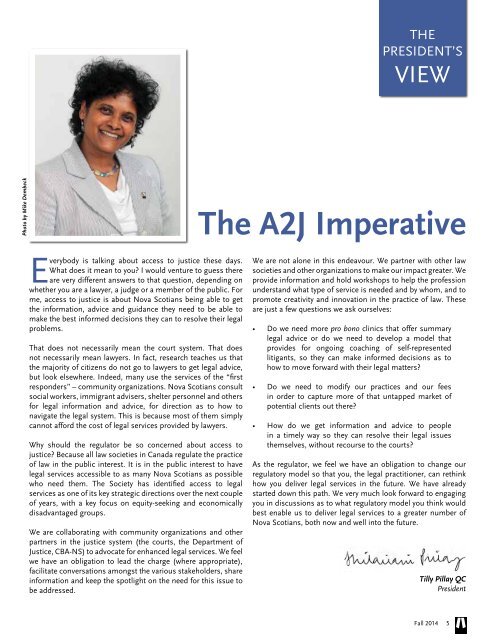11eApYW
11eApYW
11eApYW
Create successful ePaper yourself
Turn your PDF publications into a flip-book with our unique Google optimized e-Paper software.
the<br />
president’s<br />
view<br />
Photo by Mike Dembeck<br />
The A2J Imperative<br />
Everybody is talking about access to justice these days.<br />
What does it mean to you? I would venture to guess there<br />
are very different answers to that question, depending on<br />
whether you are a lawyer, a judge or a member of the public. For<br />
me, access to justice is about Nova Scotians being able to get<br />
the information, advice and guidance they need to be able to<br />
make the best informed decisions they can to resolve their legal<br />
problems.<br />
That does not necessarily mean the court system. That does<br />
not necessarily mean lawyers. In fact, research teaches us that<br />
the majority of citizens do not go to lawyers to get legal advice,<br />
but look elsewhere. Indeed, many use the services of the “first<br />
responders” – community organizations. Nova Scotians consult<br />
social workers, immigrant advisers, shelter personnel and others<br />
for legal information and advice, for direction as to how to<br />
navigate the legal system. This is because most of them simply<br />
cannot afford the cost of legal services provided by lawyers.<br />
Why should the regulator be so concerned about access to<br />
justice? Because all law societies in Canada regulate the practice<br />
of law in the public interest. It is in the public interest to have<br />
legal services accessible to as many Nova Scotians as possible<br />
who need them. The Society has identified access to legal<br />
services as one of its key strategic directions over the next couple<br />
of years, with a key focus on equity-seeking and economically<br />
disadvantaged groups.<br />
We are collaborating with community organizations and other<br />
partners in the justice system (the courts, the Department of<br />
Justice, CBA-NS) to advocate for enhanced legal services. We feel<br />
we have an obligation to lead the charge (where appropriate),<br />
facilitate conversations amongst the various stakeholders, share<br />
information and keep the spotlight on the need for this issue to<br />
be addressed.<br />
We are not alone in this endeavour. We partner with other law<br />
societies and other organizations to make our impact greater. We<br />
provide information and hold workshops to help the profession<br />
understand what type of service is needed and by whom, and to<br />
promote creativity and innovation in the practice of law. These<br />
are just a few questions we ask ourselves:<br />
• Do we need more pro bono clinics that offer summary<br />
legal advice or do we need to develop a model that<br />
provides for ongoing coaching of self-represented<br />
litigants, so they can make informed decisions as to<br />
how to move forward with their legal matters?<br />
• Do we need to modify our practices and our fees<br />
in order to capture more of that untapped market of<br />
potential clients out there?<br />
• How do we get information and advice to people<br />
in a timely way so they can resolve their legal issues<br />
themselves, without recourse to the courts?<br />
As the regulator, we feel we have an obligation to change our<br />
regulatory model so that you, the legal practitioner, can rethink<br />
how you deliver legal services in the future. We have already<br />
started down this path. We very much look forward to engaging<br />
you in discussions as to what regulatory model you think would<br />
best enable us to deliver legal services to a greater number of<br />
Nova Scotians, both now and well into the future.<br />
Tilly Pillay QC<br />
President<br />
Fall 2014 5


